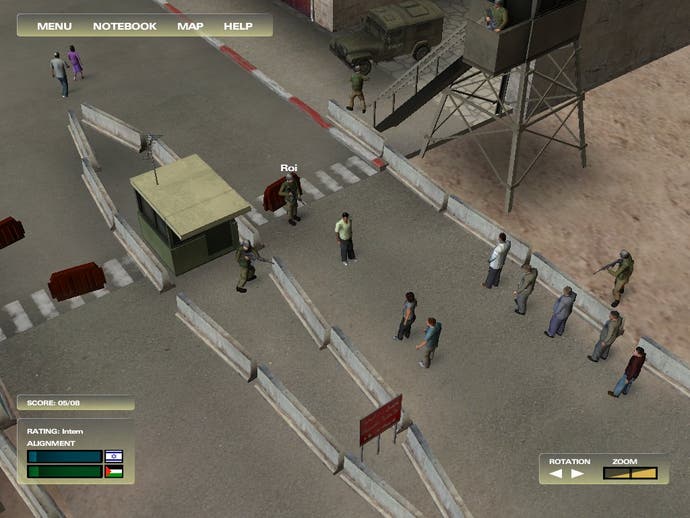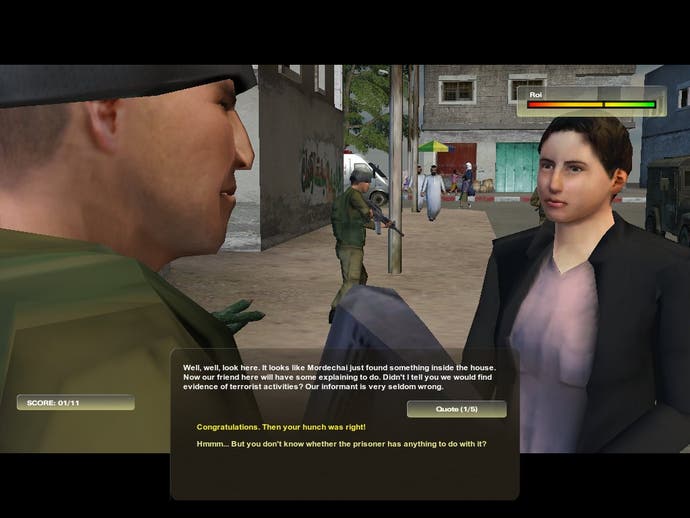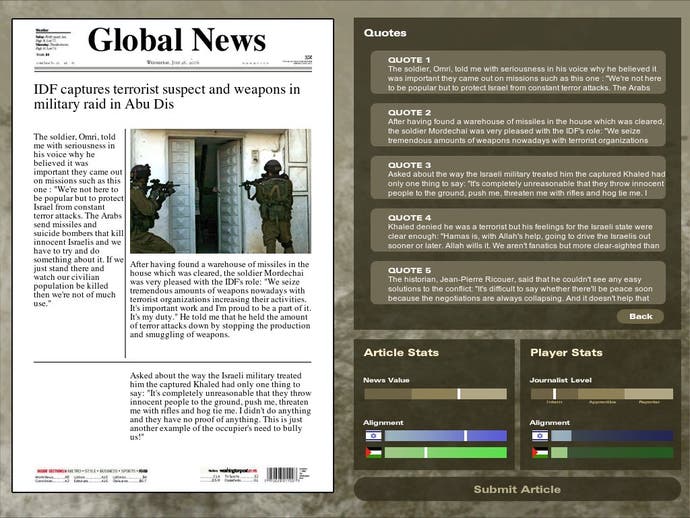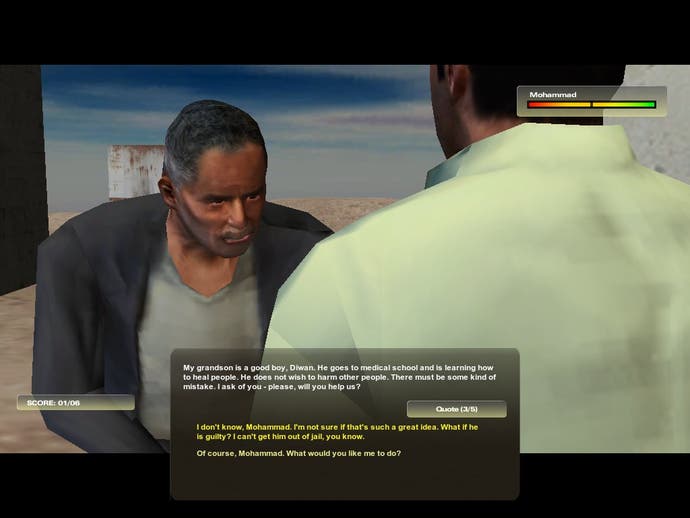Global Conflicts: Palestine
If it bleeds, it leads.
You can keep your demon-lords, your sinister schoolgirls, and your tentacled Cthulhoid abominations. None of them are half as chilling as a 15-year-old Palestinian lad with an unhealthy interest in martyr cards ("They are like your Pokemon trading cards"), Paradise, and Israeli café culture.
Nabil is one of the many uncomfortably real people you meet while playing this thought-provoking journalism RPG. Where Peacemaker had you sorting out the mess in the Middle East as either the Israeli or Palestinian premier, GC: Palestine has you reporting on it as a humble news-hound. Guide a jogging journo around a stylised Jerusalem/West Bank, seek out folk with stories to tell, harvest their words with the help of the 'Quote' button, then run home to construct a high-scoring article - it's simple.
Except it isn't.
Danish developer Serious Games Interactive are that rare thing, a band of earnest edutainers that actually believe in challenge. Though you'd have to be incredibly incompetent to fail any of the six issue-themed assignments, producing articles strong enough to make front pages is surprisingly tricky. Most of my carefully researched exposés seem to end-up buried amongst the talented pet stories on page nine, and I'm still not quite sure why.
Skewed news

I know I understand the editorial policy concept. If, at the beginning of a mission revolving around, say, suicide bombers, you choose to write for Palestine Today rather than The Israeli Post or Global News, then it's a bad idea s to go out and fill your notebook with five (the maximum number allowed) quotes that emphasise the suffering of the victims rather than the grievances of the 'holy weapons'. Common sense.
I think I get the faction alignment concept too. Your reputation in the two communities is influenced by your past output and the friendships you've cultivated. Vary your paymasters and take time out to do favours for people like Miriam, the Israeli soldier, and Shakil, the Palestinian taxi driver, and you can build trust that will open doors when you're out chasing a story.

Maybe my consistently mediocre performance can be blamed on the fact that identifying newsworthy quotes can be far from straightforward. Regularly you return to the office (a payphone in a busy Jerusalem square) with a notebook bulging with promising passages only to find none of them produce a stellar score when arranged in the empty newspaper template. I'm all for a bit of fuzziness in victory conditions, but GC: Palestine takes inscrutability a tad too far at times.
Green Line gopher
The opacity may have been a deliberate attempt to encourage replay. The Ed didn't like my slant? Right, I'll repeat the mission, this time trying some different lines of questioning. The people you encounter and stories you hear are fascinating enough to warrant a second play through, but there's not really enough freedom to entice you back for a third or fourth go. With more incentives to explore the map, more characters, and more complex trust-building chores things might have been different. Currently most of the optional side tasks comprise of little more than a short detour to deliver something or pass on a message. They are all nicely contextualised, but there's zero skill involved, which is a pity.

Fleshier quests aren't the only thing Serious Games should have borrowed from mainstream RPGs. A more elegant interface wouldn't have gone amiss. Novel subject matter and a low price (10 GBP) doesn't mean a developer can get away with ignoring conventions like mouse-wheel zooming, an on-screen compass, and mid-mission saves. There's certainly no excuse for the the lack of click-and-hold movement. Guiding your pressman from Jerusalem to Abu Dis (the Palestinian portion of the map) really shouldn't require dozens of separate clicks.
Keep your distance
Put off? Don't be. For jaundiced gamers looking for something a little different GC Palestine definitely has worth. Morally, it's one of the most interesting videogames I've played in ages. By the end of the mission sequence I felt thoroughly confused (in a good way) - torn between my professional desire to remain independent and aloof, and my duty as a human being to assuage suffering and aid my friends. The storyline steadily jams you on to the horns of this authentic dilemma, but does so without ever straying into the realms of the improbable or the melodramatic. Apart from the odd clumsy bit of dialogue, everything is remarkably believable. There's no obvious attempt to simplify or censor issues, no detectable signs of bias.

Simply being in a game world that isn't populated with 'good' and 'bad' guys is stimulating. We all know how to react when encountering a bonafide hero or a bad-to-the-bone villain, but what tone are you supposed to adopt when talking to a dehumanised IDF soldier or a Palestinian mother intensely proud of her martyr son? New experiences. New tests. I like the fact this game makes me soul-search sometimes.
This might sound strange, but I wish it made me smile occasionally too. In my experience, folk with danger all around them use humour more than most. A few wry comments sprinkled through the otherwise convincing dialogue would have made the characters feel even more real. Humour would have dissipated some of the earnestness that inevitably comes along with the concept too.
Hmm, I'm starting to fuss. Time to wind this up with a cautious recommendation. GC: Palestine doesn't offer the gloss, excitement, or replayability of a mainstream RPG, but it's intriguing and powerful enough for this not to matter... much. If you've got a passing interest in current affairs, the human condition, or the frontiers of game design then, at the very least, check-out the demo version of this noble curio. Nabil's story deserves to be told.







